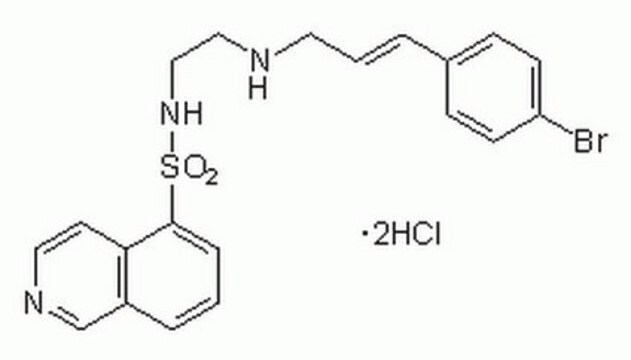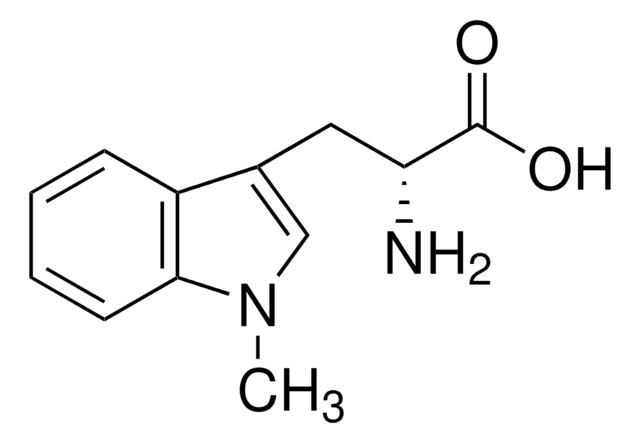399275
Nω-Hydroxy-nor-L-arginine, Diacetate Salt
A potent, selective, competitive, and high affinity inhibitor of arginase.
Synonym(s):
Nω-Hydroxy-nor-L-arginine, Diacetate Salt, nor-NOHA, 2CH₃CO₂H, L-2-Amino-(4-(2ʹ-hydroxyguanidino)butyric Acid, 2CH₃CO₂H
Sign Into View Organizational & Contract Pricing
All Photos(1)
About This Item
Empirical Formula (Hill Notation):
C5H12N4O3 · 2C2H4O2
CAS Number:
Molecular Weight:
296.28
UNSPSC Code:
12352209
NACRES:
NA.77
Recommended Products
Quality Level
assay
≥97% (TLC)
form
solid
potency
2 μM IC50
manufacturer/tradename
Calbiochem®
storage condition
OK to freeze
desiccated (hygroscopic)
color
off-white
solubility
water: 50 mg/mL
shipped in
ambient
storage temp.
−20°C
General description
A potent, selective, competitive, and high affinity inhibitor of arginase. Shown to inhibit arginase from rat liver (IC50 = 2 µM) and mouse macrophages (IC50 = 50 µM). Shown to specifically interact with the manganese-cluster of the enzyme active site. Does not function as a substrate or as an inhibitor for NOS. Hence, nor-NOHA may be a useful tool to study the interplays between arginase and NOS.
A potent, selective, competitive, and high affinity inhibitor of arginase. Shown to inhibit arginase from rat liver (IC50 = 2 µM) and mouse macrophages (IC50 = 50 µM). Specifically interacts with the manganese-cluster of the enzyme active site. Does not act as a substrate or as an inhibitor of NOS. Hence, it may serve as a useful tool to study the interplays between arginase and NOS.
Biochem/physiol Actions
Primary Target
arginase from rat liver
arginase from rat liver
Secondary Target
mouse macrophages (IC₅₀ = 50 µM)
mouse macrophages (IC₅₀ = 50 µM)
Packaging
Packaged under inert gas
Warning
Toxicity: Standard Handling (A)
Reconstitution
Following reconstitution, aliquot and freeze (-20°C). Stock solutions are stable for up to 6 months at -20°C.
Other Notes
Gobert, A.P., et al. 2000. Infect. Immun. 68, 4653.
Meurs, H., et al. 2000. Br. J. Pharmacol. 130, 1793.
Moali, C., et al. 2000. Biochemistry 39, 8208.
Tenu, J.P. et al. 1999. Nitric Oxide 3, 427.
Moali, C., et al. 1998. Biochemistry 37, 10453.
Custot, J., et al. 1997. J. Am. Chem. Soc. 119, 4086.
Meurs, H., et al. 2000. Br. J. Pharmacol. 130, 1793.
Moali, C., et al. 2000. Biochemistry 39, 8208.
Tenu, J.P. et al. 1999. Nitric Oxide 3, 427.
Moali, C., et al. 1998. Biochemistry 37, 10453.
Custot, J., et al. 1997. J. Am. Chem. Soc. 119, 4086.
Legal Information
CALBIOCHEM is a registered trademark of Merck KGaA, Darmstadt, Germany
Storage Class
11 - Combustible Solids
wgk_germany
WGK 1
flash_point_f
Not applicable
flash_point_c
Not applicable
Certificates of Analysis (COA)
Search for Certificates of Analysis (COA) by entering the products Lot/Batch Number. Lot and Batch Numbers can be found on a product’s label following the words ‘Lot’ or ‘Batch’.
Already Own This Product?
Find documentation for the products that you have recently purchased in the Document Library.
Customers Also Viewed
Jun Zhu et al.
Investigative ophthalmology & visual science, 62(7), 3-3 (2021-06-02)
To investigate the effects of ex vivo-induced bone marrow myeloid-derived suppressor cells (BM-MDSCs) on allogeneic immune responses in corneal transplantation. Bone marrow cells from C57BL/6J (B6) mice were cultured with IL-6 and GM-CSF for four days. The ex vivo induction
Rashi Sehgal et al.
Frontiers in immunology, 13, 828949-828949 (2022-06-21)
Decompensated cirrhosis patients are more prone to bacterial infections. Myeloid-derived suppressor cells (MDSCs) expand in sepsis patients and disrupt immune cell functions. Granulocyte-macrophage colony-stimulating factor (GM-CSF) therapy helps in restoring immune cell functions and resolving infections. Its role in MDSC
Alessandra Sacchi et al.
Cell death & disease, 11(10), 921-921 (2020-10-29)
The immunological mechanisms underlying the clinical presentation of SARS-CoV-2 infection and those influencing the disease outcome remain to be defined. Myeloid-derived suppressor cells (MDSC) have been described to be highly increased during COVID-19, however, their role remains elusive. We performed
Máté Kiss et al.
Cancer immunology research, 9(3), 309-323 (2020-12-29)
IL1β is a central mediator of inflammation. Secretion of IL1β typically requires proteolytic maturation by the inflammasome and formation of membrane pores by gasdermin D (GSDMD). Emerging evidence suggests an important role for IL1β in promoting cancer progression in patients
Our team of scientists has experience in all areas of research including Life Science, Material Science, Chemical Synthesis, Chromatography, Analytical and many others.
Contact Technical Service
















